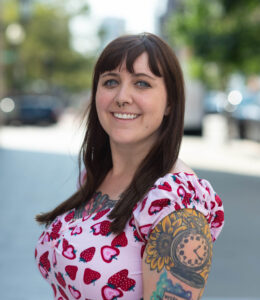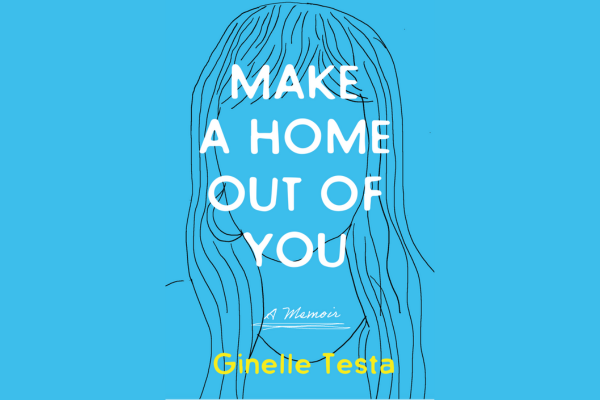Humans typically need a sense of home—a world or space in which we feel safe, comfortable, and grounded. We find “home” in people, places, or activities, but sometimes the search is long and difficult. Such is the message of a new memoir, Make a Home Out of You, by Ginelle Testa, a non-binary, Boston-based author.
Testa told Tagg Magazine that their debut book started as a reflection on trauma of their youth, manifesting as stories of struggles with family, eating disorders, coming to terms with sexuality and gender identities, and sex and substance addiction. But through writing, Testa realized the memoir’s titular theme: All those struggles are linked to a search for “home.” “[When considering titles for the book] the metaphor of building a home with substances and behaviors and people came to me,” said Testa. “And [I realized] that’s what I’ve been trying to do for years—build a home within myself.”
In the book, released September 3 by She Writes Press, Testa charts their life struggles and healing journey with an appealing rawness, seemingly not shying away from disclosing their worst mistakes, darkest days, and deepest insecurities. This makes the memoir an emotionally heavy read, but one that’s arguably worth the effort thanks to the relatability. Also softening the blow of the content is the easy-to-follow chronological approach to the narrative, and pop culture references that should put any millennial into a nostalgic mood, even as the references are paired with tough subjects—e.g., how celebrities in magazines influenced Testa’s body image and eating disorders. The references are part of the skillful recipe for scene-setting that Testa shows off throughout the book; they deftly bring a reader into a given moment or experience.

However, writing this book wasn’t as easy for Testa as the book’s impressive elements might suggest. It involved substantial time and energy. Testa began writing it about eight years ago, using National Novel Writing Month as motivation to turn memories they’d jotted down into an actual book. Whittling things down to the book took time.
Additionally, Testa said some of the content was particularly difficult to delve into. For example, the eating disorders, because Testa hates how fat-phobic they were at the time of the noted experiences. “I was fat-phobic for a long time; I hated myself and I was really uncomfortable in my skin,” said Testa. “I had to write from that perspective for a while…[and] it was really challenging to put myself back in that mindset.”
To cope with returning to such dark headspaces, Testa said they created a mindful ritual of lighting candles for a writing session, and turning off or blowing out the candle when they were done writing. “I had to contain [my writing mindset] in that period, because if I didn’t, it would leak out into the rest of my life and make me sad and upset,” said Testa.
Testa also had to face the potential of backlash from people they wrote about. They gave only their parents a heads up, and while the news wasn’t initially well-received, Testa is currently in a much better place with both their parents than during their youth. What’s more, friends who have read the book have given Testa positive feedback, saying the author wasn’t unnecessarily harsh to anyone. Some unlikely supporters, such as straight cisgender men, even praised the book—for very niche ways in which they related to it.
Testa got something else for themselves from writing the memoir: self-forgiveness.“There were a lot of things I had done in active addiction that I felt really shameful for,” said Testa. “Through the writing process, I was able to [tell myself] ‘you were a sick person, not a bad person…you’re getting better, and you don’t have to carry all that guilt and shame.’”
Testa is equally excited about what they want readers to get from the book. “I hope what they take away is… that there’s worth in getting comfortable with who you are, without needing to reach for [substances and] all these other things to make you feel OK,” Testa said.
Testa isn’t done giving their story to readers, either. They plan to next write a queer romance based loosely on their own experience finding love in an unlikely place—Testa’s real-life step toward finding their way home.


